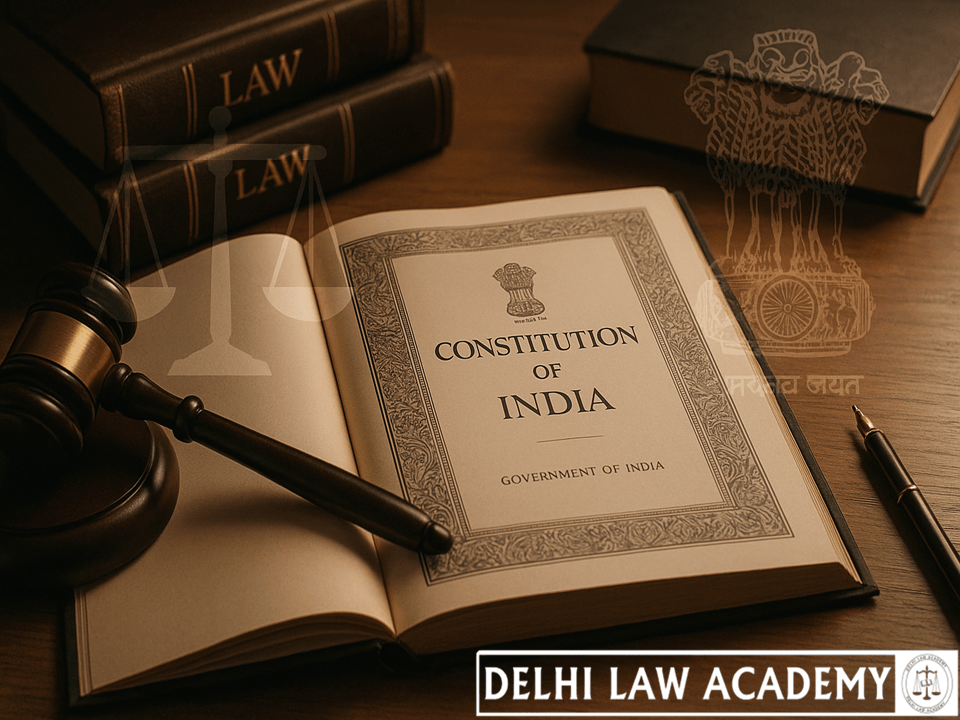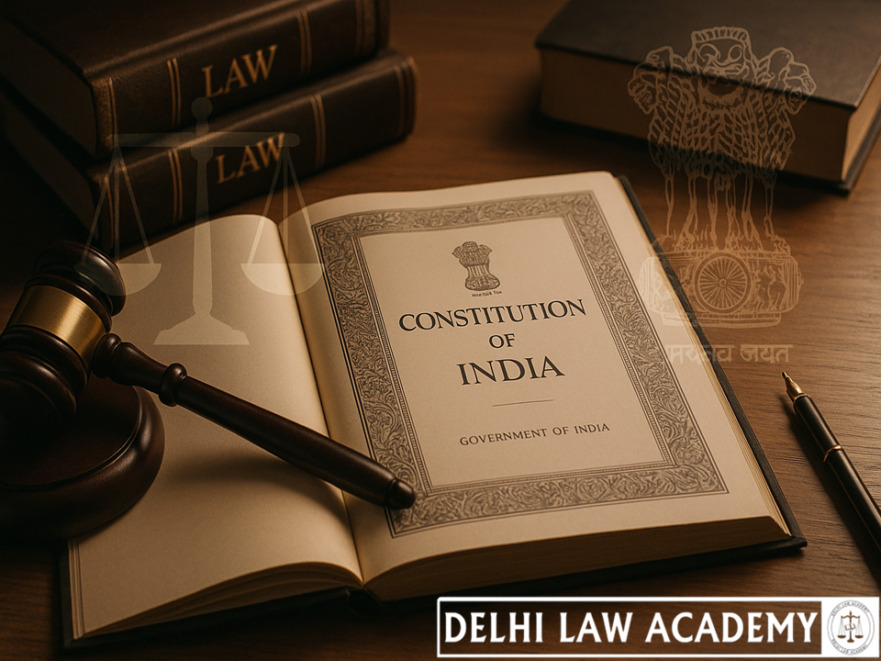
📘 Centre–State Administrative Relations, Tax & Funds (Articles 256–267)
CENTRE – STATE ADMINISTRATIVE RELATIONS
TAX AND FUNDS
“No tax shall be levied or collected except by authority of law”
Article 256 – 267
📝 TOPICS
- Obligation of States
- Control of Union over States
- Adjudication of river water disputes
- Inter-State Councils
- Consolidated Fund of India
- Contingency Fund of India
• Every State shall exercise its executive power so as to ensure compliance with laws made by Parliament and existing laws.
• A State shall exercise its executive power so as not to impede or prejudice exercise of executive power of Union.
• Union may issue directions to a State as to measures to be taken for protection of railways within the State
• Parliament may by law provide for adjudication of any dispute or complaint on use, distribution or control of any waters of any inter-State river
Delhi Law Academy Jaipur presents below for aspirants of RJS, DJS, PCS (J) and other Judicial Services throughout India a simplified Note on the Constitutional provisions relating to Centre – State Administrative Relations and tax and Funds.
📜 Constitutional Provisions
Article 256 — Obligation of States
• Every State shall exercise its executive power
o so as to ensure compliance with laws made by Parliament and existing laws
• Union may issue directions to a State necessary for such compliance
Article 257 — Control of Union over States
• A State shall exercise its executive power
o so as not to impede or prejudice exercise of executive power of Union
• Union may issue directions to a State necessary for this purpose
• Union can issue directions to a State
o as to construction and maintenance of means of communication
o declared in the direction to be of national or military importance
• Parliament continues to have the power
o to declare highways or waterways
o to be national highways or national waterways
• Union may issue directions to a State
o as to measures to be taken
o for protection of railways within the State
Article 261
• Final judgment or order passed by any civil court anywhere in India
o shall be capable of execution throughout India
• Full faith and credit shall be given throughout India
o to public acts, records and judicial proceedings of Union and every State
Article 262 — Adjudication of river water disputes
• Parliament may by law
o provide for adjudication of any dispute or complaint
o on use, distribution or control of any waters of any inter-State river
• Parliament may by law provide
o that neither Supreme Court nor any other court
o shall exercise jurisdiction in respect of any such dispute or complaint
Implementation
• Inter State Water Disputes Act, 1956
• Section 11 of this Act excludes jurisdiction of Supreme Court
o in respect of a water dispute referred to the Tribunal
Inter-State Water Dispute Tribunals
• 1969- Krishna Water Disputes Tribunal
• 1969- Godavari Water Disputes Tribunal
• 1969- Narmada Water Disputes Tribunal
• 1986- Ravi and Beas Water Disputes Tribunal
• 1990- Cauvery Water Disputes Tribunal
• 2004- Second Krishna Water Disputes Tribunal
• 2010- Vansadhara Water Disputes Tribunal
• 2010- Mahadayi Water Disputes Tribunal
Article 263 — Inter-State Councils
• President may establish a council in public interest for
o inquiring into and advising upon inter-State disputes
o investigating and discussing subjects of common interest
o making recommendations for coordination of policy and action on any subject
Implementation
• Central Council of Health
• Central Council of Local Government
• Regional Councils for Sales Tax
• Inter-State Council
💰 PART XII: Finance, Property, Contract and Suits
Article 265
• No tax shall be levied or collected
o except by authority of law
Article 266 — Consolidated Fund of India
• Consolidated Fund of India shall comprise of
o all revenues received by Govt of India
o all loans raised by Govt of India
o all repayment of loans received by Govt of India
• Consolidated Fund of State shall comprise of
o all revenues received by Govt of State
o all loans raised by Govt of State
o all repayment of loans received by Govt of State
• No moneys out of CFI or CF of State
o shall be appropriated
o except in accordance with law
• All other public moneys
o received by Govt of India
o shall be credited to Public Account of India
Article 267 — Contingency Fund of India
• Parliament may by law
o establish a Contingency Fund in the nature of an imprest
into which shall be paid from time to time
sums determined by such law
• This Fund shall be placed
o at disposal of President to enable him to make advances
for meeting unforeseen expenditure
pending authorization by Parliament u/a 115 or 116
Similarly:
• There shall be a Contingency Fund for every State
o to be placed at disposal of Governor
📘 Stay Ahead with Delhi Law Academy!
Get access to free monthly current affairs, read our insightful blogs,
and explore free study resources prepared by experts at DLA Jaipur. 🚀
Frequently Asked Questions (FAQs)
✅ The Inter-State Water Disputes Act, 1956 creates Water Dispute Tribunals.
✅ The Supreme Court’s jurisdiction can be excluded for such disputes under Section 11 of the Act.
• Resolve inter-State disputes
• Discuss common policy matters
• Recommend coordination between States and the Union
Examples include the Inter-State Council and various Central Councils.
✅ No money can be withdrawn from the CFI without Parliamentary approval.
✅ States have their own Consolidated Funds as well.
✅ Money is replenished later by Parliamentary authorization.
✅ Similar contingency funds exist for each State, controlled by the Governor.
✅ The Executive cannot impose or collect taxes without legal authority.
✅ This ensures fairness, legality, and financial accountability.
Contact us
📍 Delhi Law Academy – Jaipur Branch
6C, Tower 2, Coaching Hub, Pratap Nagar, Jaipur – 302033
📞 Phone:
+91 9911916552
+91 8447285606
✉️ Email:
contactus@delhilawacademy.com

